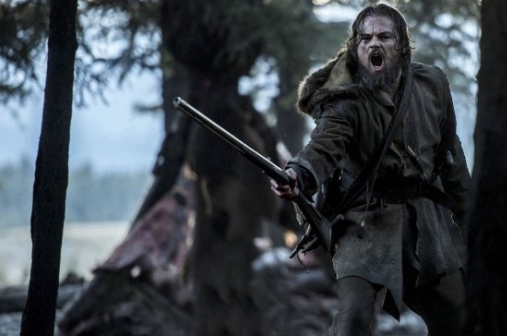
The year is barely days old, but I'll be surprised if it contains many better movies than The Revenant, Alejandro G. Iñárritu's endurance epic which this week picked up 12 Oscar nominations. The partly-true story of 19th century frontiersman Hugh Glass, left for dead by his fellow fur-trappers in the wilds of the Louisiana Purchase, is an astonishingly beautiful and thought-provoking film with a truly great central performance from Leonardo Di Caprio. It's also packed with theological and religious themes.
The plot twists fairly early on, so let's leave the setup short. Glass is part of a group of trappers which is routed by heavily-armed Native Americans; while on the run he's mauled by a bear. In increasingly unforgiving conditions, it's clear the badly-injured Glass is holding up his group, so he's to some extent abandoned in the wilderness. What follows is a gruelling, gripping endurance test, as the trapper attempts to overcome the odds – and various dangers – and return safely to his fort home. Think Bear Grylls goes to hell, in 1823.
The film is about a lot of things: survival, betrayal and revenge and among them. For me though, it's principally concerned with the interplay and contrast of beauty and horror. First, it's a film that goes to great lengths (Iñárritu's approach to filming, which saw many crew members resign, was punishingly authentic) to show us the full glory of the untamed wilderness. What the Lord of the Rings films did for New Zealand, this does for the parts of British Columbia in which it was mainly shot – although it's unlikely to inspire quite so much tourism. The scenery is very intentionally stunning throughout, as if the director is creating a sort of wild Garden of Eden over which man is certainly not in control.
In that context though, The Revenant is also an exploration of horror; of the sins of American colonialism; of man's inabilty to resist the basest temptations of money and sex, and of nature at it's most unforgiving. If this is a kind of Eden, then man is most definitely already fallen, wreaking havoc and destruction across the blood-stained snow of the landscape, and learning the hard way that he is not yet master of his domain. It seems to be an entirely Biblical view of the world; a perfect creation spoiled by the evils of humanity.

As he begins his unlikely attempt to return home, Glass is, very loosely speaking, a messianic figure. There's one very memorable 'resurrection' scene in which Di Caprio might as well be rolling away a large stone, and his mission becomes one of righting injustice and overcoming the story's chief 'sinner.' There's more to it than that though; the old-fashioned word of the title refers to a corpse who has come back from the dead to terrorise the living, and Glass certainly has revenge on his mind as he makes his way through the frozen wastes; in truth it's this which drives him, rather than some high-minded sense of hope.
While it's not a neat Christian allegory then, the film is still absolutely brimming with theological ideas. God is occasionally mentioned, but his influence and presence are acknowledged throughout, as Iñárritu explores ideas of grace, fatherhood, sacrifice, salvation, 'promised land', heaven and hell. In particular the dreams experienced by Glass at his lowest ebbs nod strongly at a Christian view of afterlife; film students will be arguing over the meaning of one, set in a ruined church, for many years to come. (They might also wonder if Iñárritu really did intend to slip in an unlikely reference to the Empire Strikes Back...)
The Revenant fully deserves its plaudits as a truly-cinematic spectacle which deserves to be seen on a big screen. It's not just a visual marvel though; it's an immersive, powerful drama held together by Di Caprio's stunning lead performance, keeping us on the edges of our seats as he drags himself grunting, sweating and bleeding through the impossible landscape. If he doesn't finally win the elusive Best Actor Oscar for this, he may as well give up trying; something his character in this extraordinary film seems simply unable to do.
Martin Saunders is a Contributing Editor for Christian Today and the Deputy CEO of Youthscape. You can follow him on Twitter: @martinsaunders

















